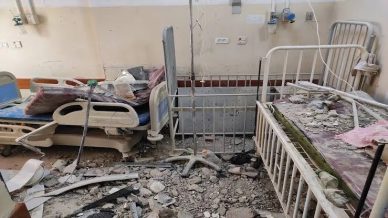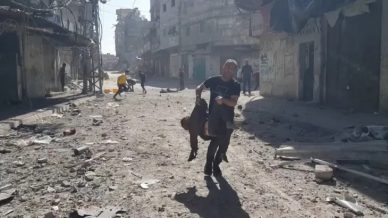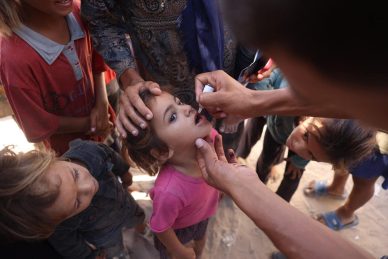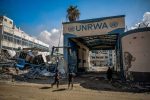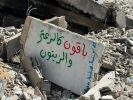GAZA, (PIC)
The young Palestinian Samer Khalil walks about 4 km to reach a point to charge his mobile phone with electricity, in order to be able to communicate with the rest of his family members scattered between Khan Yunis, Deir Al-Balah and the north of Gaza.
Since the start of the Israeli war on the Gaza Strip about 10 months ago, Israel has declared depriving the residents of the Gaza Strip of food, water, fuel and electricity, which has put the entire Strip in the longest period of power cuts.
In addition to generators running according to the availability of fuel to ensure the minimum operation of hospitals and water pumping in municipalities, hundreds of thousands of residents and displaced persons depend on the remnants of solar panels that survived the Israeli bombardment.
Back to the primitive life
Khalil (24 years old) tells the correspondent of the Palestinian Information Center, “We have returned to the primitive life, no electricity and no lighting, the lucky one who has a small battery, or a solar panel, I walk 4 kilometers every two days to a paid electricity point to charge the mobile phones for the family and a small battery we use for lighting.”
Charging mobile phones and small batteries has become a source of income for many young men who were able to secure solar panels that survived the Israeli bombardment.
Since the first days of the war, Israel has cut the electricity lines coming from its side to the Gaza Strip, which were providing 120 megawatts, while the suspension of fuel imports led to the closure of the sole power plant in the enclave. Furthermore, Israel carried out intensive raids on solar power systems in institutions and homes.
The longest period of outage
This situation has plunged the Gaza Strip into total darkness and continuous power cuts for the longest period and around the clock, in an unprecedented case in the world.
Electricity was a main headline for the crises of the Gaza Strip before the war, as it used to reach homes for only 8 hours a day, and with the start of the war it was cut off completely, leaving the people of the Strip in total darkness until now.
How to live without electricity!
Citizen Hamza Bassala questions in an interview with PIC, how any human being can live in this day and age without electricity.
He affirms that it is the height of injustice that people have been deprived of electricity, which is the lifeblood of existence, for the tenth consecutive month.
Amer Al-Shami explains that the prolonged power outage has returned everything to a primitive way of life, as electricity is involved in everything. Today, there is no lighting, no electricity for the refrigerator or the washing machine, so women wash clothes by hand, and everyone is looking for primitive ways to cool down by burying themselves in the sand, and there is no use of fans in the displacement camps.
He added that the repercussions do not stop there, as the electricity crisis has caused a water crisis, as the availability of water depends on the availability of fuel for the generators, and this has become a story in itself, and the cost of providing fuel is high.
He pointed out that the Israeli bombardment destroyed most of the facilities and stores, and what remains of them is unable to start any business due to the lack of electricity. “In short, we have returned to the primitive era of darkness and reliance on fire.”
People have been deprived of lighting, as they and their children sleep in utter darkness, with great fear due to the continued Israeli bombardment and attacks.
Water crisis
As reported by the PIC reporter, based on local sources, the power outage has had a very significant impact on the ability to extract, distribute and deliver water, whether to the remaining homes or the displacement camps and shelters.
The sources add that the power outage has affected the operation of water desalination plants, leading to a rise in their prices, and citizens resorting to drinking water unfit for consumption.
The suffering of the people due to the deprivation of electricity is evident in various ways. They are forced to sleep in their hot homes and tents, without ventilation or the use of cooling devices.
Citizen Abdullah Muhanna says that he and his children sleep in intense heat inside their asbestos-roofed home in the Deir Al-Balah refugee camp in the Gaza Strip. He adds that the heat has exhausted them and sickened their children, disturbing their sleep and residence.
Muhanna expresses his outrage at the world’s silence about the crimes of the Israeli occupation army, calling on the Arab nation to take an honorable stand.
The Ministry of Health periodically issues appeals to provide fuel and generators to ensure the operation of hospitals, warning of the danger of their shutdown.
Electricity has been cut off from Gaza hospitals several times, and partially restored through generators operated with fuel provided by international parties.
The suffering from power cuts is not limited to this, as it extends to threaten life itself. Citizen Siham Radwan tells the PIC correspondent that she needs electricity to operate the medical mattress on which she has been bedridden for years due to a stroke.
She explains that without operating the medical mattress, her body begins to swell and erode, causing her increasing pain and serious health complications.
The PIC correspondent confirmed, based on field observations in the heart of the suffering in the displacement areas, the deadly effects of the power outage.
He emphasizes that the citizen in Gaza lives a primitive life, with the interruption of electricity and many basic necessities.


